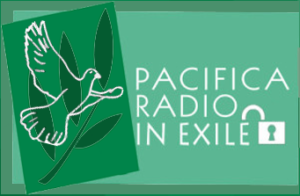Berkeley-Pacifica’s national board, which met a whopping four times in the month of March, spent most of its open sessions suspended in the twilight zone, although some mild improvement was noticeable by the end of March. In a month that began for Pacifica with a smashingly successful one-day national fundraiser and ended with the timely submission of a stabilization plan to California’s Registry of Charitable Trusts, the board meetings were wildly out of touch, mostly focusing on the 2014-2016 Siegel/Brazon majority’s difficulties in adjusting to their current minority postion.
Since there is much good news to share, we don’t want to harp solely on board meeting disruptions. Pacifica members should review the stabilization plan submitted to the California Attorney General on March 30 and can read it here. As an addendum to the document, which focuses on returning to financial sustainability, reform of governance, and improving managerial performance; the following can be reported about Pacifica’s current status:

1) Empire State Building, Pacifica’s largest aggressive debtor, declined to file for summary judgment in their lawsuit, instead scheduling a settlement conference for late April.
2) The Registry of Charitable Trusts formally set the drop-dead due date for Pacifica’s delinquent FY 2015 audit report forward toAugust 27.
3) A generous WPFW donor retroactively released a donor restriction on $140K of capital funds that WPFW used for operating costs in 2016, freeing Pacifica of the requirement to replace the funds immediately.
4) Armanino LLC declined to perform the FY 2015 financial audit, which may allow Pacifica to rein in audit expenses that had soared to $193K for FY 2014, possibly the most expensive audit of a $13 million dollar organization in history.
All of this represents positive developments for the organization, which had looked to be on the precipice of disaster only a few short months ago. KPFK GM Christine Blosdale also asked this publication to update KPFK fund drive numbers reported in the last edition, because the numbers were too low. KPFK’s February fund drive actually brought in $618K, which was $123K above the $495K goal. Pacifica in Exile regrets the error.
Since relatively few Pacifica members listen to the archived board meeting audio, here are some brief summaries and highlight reels.
On March 23, the national board met. The meeting marked the initial introduction of a new teleconferencing system, Maestro Conference. The Maestro system, which is heavily used throughout the nonprofit sector, offers a number of technological improvements including personalized pin codes, reduced dropouts and background noise, and the ability to mute disruptive participants. The muting capacity, although it wasn’t used during the March 23 meeting, appeared to strike fear into the hearts of the disruptors. It was pretty much all they talked about all night. The meeting, which was almost entirely procedural in nature, featured votes with most of the board saying yes or no calmly into the phone and a small quadrant (most noticeably Adriana Casenave) insisting they were being muted and could not vote, even as they shouted loudly into the phone. At the end of the meeting, a barely audible Cerene Roberts can be heard despairing that there were not enough points of order during the meeting. It is true the 3/23 meeting fell somewhat short of the “Disruptathon” standard of 176 points in 4 hours. You can listen to a summary reel from the March 23 meeeting here. In the closed session, without an online audience, the board did somewhat better, re-hiring Sam Agarwal as the Chief Financial Officer and authorizing interim ED Bill Crosier to select and hire an attorney to replace corporate counsel Dan Siegel, who resigned days after Lydia Brazon was let go. The board also formally censured a disruptive board member for dilatory comments, per their report out. Bill Crosier’s comprehensive executive director’s report is available here. As with the previous three he has prepared in the last 7 weeks, it was never presented during a board meeting.
A week later on March 30, the board met again, navigated more points of order about the telephone system and meeting notices and finally conducted some business by restoring committees to one director per station, which caps the size so committees do not have 20-person rosters. Not to be deterred, disruptive directors Cerene Roberts and Adriana Casenave proceeded to nominate themselves for every single one of the board’s 9 committees and 4 task forces, a total of 13 different bodies. No independent director nominated themselves for more than 4 of the 13. During the meeting, KPFT listener rep Adriana Casenave continued to shout loudly into the phone “I am muted”, apparently under the impression she was not being heard on the Internet stream. As your ears will attest, she was more than audible. A brief summary reel can be heard here. New officers Jonathan Alexander (KPFK – Chair), Sabrina Jacobs (KPFA – Vice Chair) and Akio Tanaka (KPFA – Secretary) continued their baptism by fire, but are gaining confidence in handling the ongoing disruption attempts they have faced since their elections to officer positions in February.

KPFA’s local station board met on March 18. Newly-elected SK-affiliated member Craig Williams abruptly departed and was replaced by UCR’s Marilla Arguilles. On local matters, the board mostly talked about the flooding and mold problems, which while long-standing, were especially acute over the last rainy Bay Area winter. The station has been cited by OSHA in the past for untreated mold and is looking for a permanent solution to the structural problem. The station’s building was erected over a creek. For the rest of the meeting, having run out of local matters, the KPFA local station board discussed visiting the California Attorney General. Some members of KPFA’s local station board have expressed eagerness for the Attorney General to dissolve the Pacifica Foundation, although such an action would likely result in the return of the licenses to the FCC for reassignment.
According to KPFA listener rep Bill Campisi, former corporate counsel Siegel and Yee has to date refused to return legal files to Pacifica after resigning. Among the legal matters Siegel and Yee handled from 2014-2016 are collections lawsuits from Pacifica Reporters Against Censorship, Robert Half, and former PNB member Stephen Brown, governance lawsuits Yeakey vs. Pacifica, Young vs. Pacifica and PDGG vs Pacifica, the lengthy SAG-AFTRA arbitration at KPFK, and the correspondence audit with the CA Registry of Charitable Trusts. Siegel and Yee are required to return the records to the Pacifica Foundation.
NY’s WBAI had it’s most lucrative fundraiser in several years in February, booking almost $500,000. Program manager Tony Bates’ report can be read here. WBAI local station board member and radical attorney Lynne Stewart passed away from cancer in March, almost three years after compassionate release from a lengthy and undeserved prison term.

At KPFT, the managerial transition from long-time manager Duane Bradley, who was in place for almost a decade and a half, continues to be a bit troubled as Bradley’s departure has been accompanied by the loss of the program and development directors, leaving a huge gap in experienced management. The usually stable Houston station has been struggling. It’s new independent LSB has some work to do to re-balance the station after the Siegel/Brazon local station board in 2015-2016 succeeded in their campaign to remove Bradley and “rely more on volunteers”.
The Siegel/Brazonites exported the national board disruption and chaos back to Los Angeles on March 12, when cacaphony and a physical altercation resulted in an adjournment of the local station board meeting for the safety of all concerned. The disruption was orchestrated by former volunteer coordinator Adam Rice, who had earlier hijacked KPFK’s Facebook page and threatened to destroy it unless $100,000 was delivered to Leslie Radford, who was let go as KPFK’s general manager onFebruary 27. Rice faced removal as a staff representative on KPFK’s local board due to the extortion attempt. The board meeting audio is mostly yelling, but here is a few minutes sampling of the noise. The local board madness was a big contrast to the station’s robust last week of fund drive and greatly increased morale. New general manager Christine Blosdale prepared a report for the board. You can read it here.
After 16 years Pacifica Reporters Against Censorship, the protest movement that became Free Speech Radio News has announced all production will be terminated at the end of April. The news collective, which once produced a daily news half hour with a network of stringers across the world, suffered greatly when Pacifica, its primary funder, lost Corporation for Public Broadcasting Funding and could no longer turn over its NPPAG (national programming) grant to fund the show’s production. Attempts to produce segments for pay and just one weekly 30-minute newscast for the past few years, could not garner sufficient resources to survive. Nell Abram’s announcement can be seen here.

A timeline of the 35-month long coup by the Siegel/Brazon faction can be seen here.
**
If you value being kept up to speed on Pacifica Radio news via this newsletter, you can make a little contribution to keep Pacifica in Exile publishing . Donations are secure, but not tax-deductible. (Scroll down to the donation icon).
Pacifica in Exile readers may write to the board at pnb@pacifica.org.
To subscribe to this newsletter, please visit our website at www.pacificainexile.org
###
Started in 1946 by conscientious objector Lew Hill, Pacifica’s storied history includes impounded program tapes for a 1954 on-air discussion of marijuana, broadcasting the Seymour Hersh revelations of the My Lai massacre, bombings by the Ku Klux Klan, going to jail rather than turning over the Patty Hearst tapes to the FBI, and Supreme Court cases including the 1984 decision that noncommercial broadcasters have the constitutional right to editorialize, and the Seven Dirty Words ruling following George Carlin’s incendiary performances on WBAI. Pacifica Foundation Radio operates noncommercial radio stations in New York, Washington, Houston, Los Angeles, and the San Francisco Bay Area, and syndicates content to over 180 affiliates. It invented listener-sponsored radio.



KPFAs’ building was built over a creek ? I remember when they were raising money for this project. It seems the “conscious” folk at KPFA/ Pacifica would have been a little more careful in locating their building. Feng Shui aside, I listened to your aptly titled snippet “noise”, which sounded almost soothing.
I’d keep an eye on Smeagol tho, I didn’t like that bit about filing for a charitable trust behind our backs.